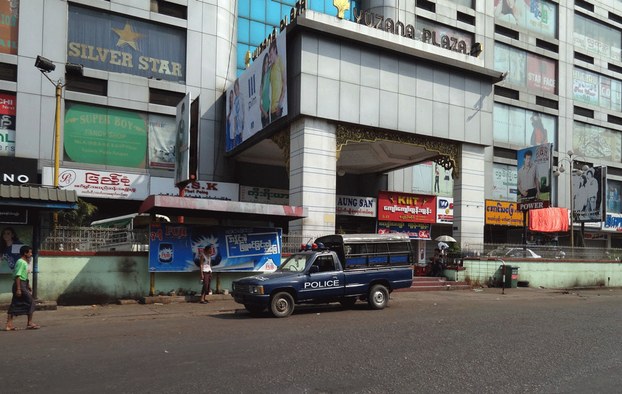




Communal riots in Burma spread closer to the commercial capital Rangoon, officials said Tuesday amid calls to take firm and swift action against groups which were behind the violence and appear to be well organized.
The situation in central Meikhtila city, where about 40 people were killed and 10,000 displaced in clashes between Muslims and Buddhists since last Wednesday, has been mostly brought under control although it remained under curfew with the military patrolling the streets, the offcials said.
But the riots had spread to Gyopingauk, Minhla, and Okpho, three townships in the Bago region about 100 miles (150 kilometers) north of Rangoon where curfews have also been imposed after unidentified groups torched mosques, houses, and shops on Monday and Tuesday.
Rangoon Division Chief Minister Myint Swe, accompanied by several senior central government officials, met representatives from 29 political parties on Tuesday, appealing to them to help the authorities contain the violence and hinting that some "small" political parties could be behind the riots.
"He explained to us that they are trying to allay the concerns of the people of Rangoon," said Nyan Win, a member of opposition leader Aung San Suu Kyi's National League for Democracy Central Committee.
"He hinted that some small political parties are plotting the violence," Nyan Win said.
Witnesses of the violence in Bago said the violence appeared to be organized.
Kyaw Thet, a member of the "88 Generation" pro-democracy movement in Sittwin in Bago region, told Agence France-Presse that dozens of strangers on motorcycles arrived late on Monday and destroyed the town's mosque.
"Then they went to a tea shop owned by Muslims and destroyed the inside of the shop," he said.
"Before they came, we had a blackout in the town and our telephone lines were cut. They also incited people to commit violence," he added.
'Troublemakers'
Min Ko Naing, also a member of the 88 Generation movement, told RFA's Burmese Service that the mobs attacked both Buddhist and Muslim prayers houses. He called on the security forces to use all of their resources to nab them.
"It is important to know whether the armed forces can control and stop these troublemakers and how these troublemakers can get into the cities easily and disappear quickly," he said. "This also reflects on the efficiency of the armed forces."
Min Ko Naing recollected that the military was swift and used brutal force to suppress protests by monks and students during the decades of junta rule in the past.
"When high school students were marching with peacock flags and when Buddhists monks were marching peacefully, they got shot by security forces. That was an extreme measure. Now, they cannot stop and arrest the troublemakers behind this violence. These are also extreme actions and we should not allow any extremism."
In a statement late Monday, Burma’s nominally civilian government under reformist President Thein Sein called for an end to “terrorist acts and religious extremism.”
“As the government is now working on moving ahead with democratic reforms and development, people are urged to refrain from terrorist acts and religious extremism which can harm this work,” the statement said, adding that the authorities would "address all terrorist attacks including incitements for racial and religious attacks."
The government also pledged to provide emergency food and shelter to the displaced in Meikhtila and resettle them as soon as the situation becomes stable.
Emergency
Thein Sein announced a state of emergency in Meikhtila on Friday, sending hundreds of troops into key areas throughout the city and restoring calm. Several suspects have been arrested.
The riots in Meikhtila were sparked by an argument between a Muslim gold shop owner and his Buddhist customers. By the time the violence was brought under control, as many as 13 mosques had been razed. Most of the homes and shops that were destroyed were Muslim-owned.
Violence between Burma’s Buddhist majority and the country’s Muslim minority, which accounts for some 4 percent of the nation’s 60 million people, is threatening to derail Thein Sein’s plans for national reconciliation and democratic reform following nearly five decades of military rule.
The riots in Meikhtila suggest that anti-Muslim sentiment is not limited to western Burma’s Rakhine state, where two separate outbreaks of violence between Muslim Rohingyas and Buddhist Rakhines left at least 180 dead and tens of thousands homeless.
Reported by Zin Mar Win and Kyaw Kyaw Aung for RFA's Burmese Service. Translated by Khet Mar. Written in English by Parameswaran Ponnudurai.